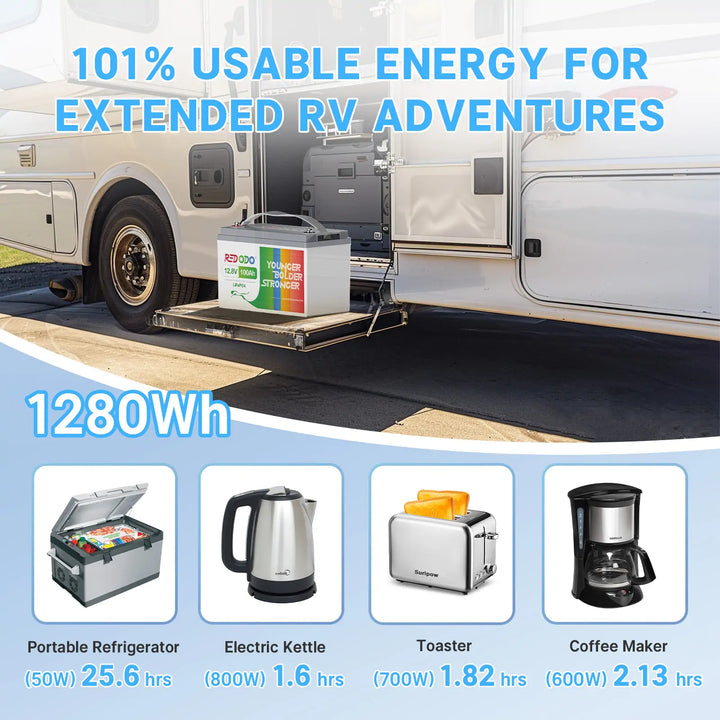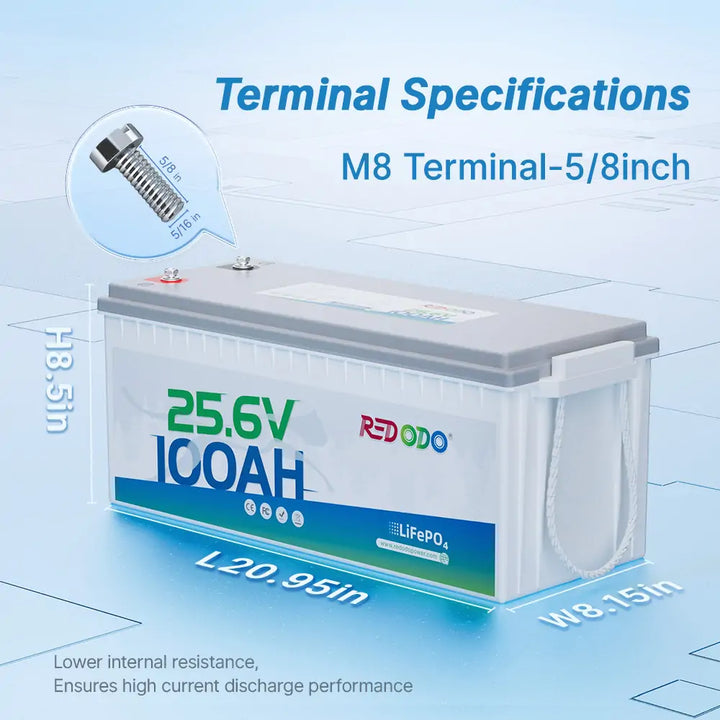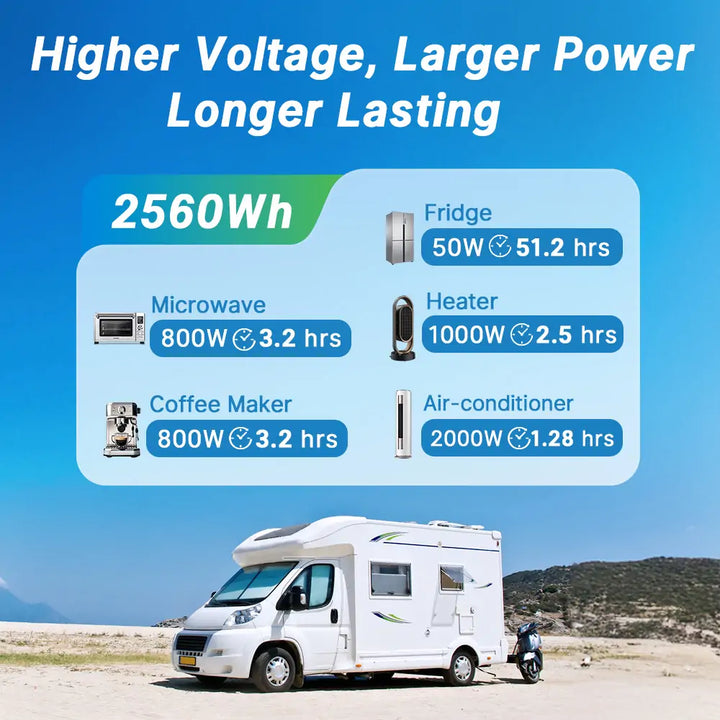When it comes to powering your RV, choosing the right 12V or 24V battery system voltage is crucial for optimal performance and efficiency. Most RVs are equipped with a 12V power system, as it is the most common option. However, with the increasing popularity of RV solar panel systems, 24V power systems are becoming more common. Deciding between 12V and 24V battery systems might seem confusing at first, but understanding the differences, advantages, and drawbacks of each will guide you in making the best decision for your specific needs.
Table of Content
- 12V vs. 24V Battery Systems
- Comparing 12V vs 24V: Pros and Cons
- Which is Better for RV, 12V System or 24V System?
- How To Use A 12V System to Create A 24V System?
- Impact of Battery System on Electrical Components and Appliances
- FAQs on 12V/24V Battery Systems for RVs
- Conclusion: Making the Right Choice
12V vs. 24V Battery Systems
Before we introduce the battery system, let's first understand the nominal voltage.
Nominal Voltage Explained
The nominal voltage of a battery refers to its average output when fully charged. It represents the voltage level at which the battery is rated and is used for defining the battery's capacity and performance. 12V and 24V are the common nominal voltage of RVs.
The battery's nominal voltage depends on the state of charge and the load, it may be slightly higher or lower.
12V Battery System
12V battery systems are the most common in RV applications. They are compatible with most vehicle components and are typically sufficient for power requirements below 3000W. Most RV appliances, such as lights, fans, and water pumps, are designed to operate on 12V power, making this system a convenient and straightforward choice.
The Redodo 12V 100Ah Lithium Battery provides an impressive 1280Wh of energy, ensuring stable and reliable power for your 12V RV appliances.
24V Battery System
24V battery systems offer higher voltage, reducing current by half and generating less heat, which leads to improved efficiency. These systems are often used in applications where higher power output is required or where minimizing resistive losses is a priority.
For instance, if you need more than 3000 watts of power or have a solar panel system generating more than 3000 watts, it may be beneficial to switch to a 24V system. This switch allows for smaller gauge wiring, increasing overall system efficiency.
48V Battery System
While 12V and 24V systems are the most common in RVs, 48V battery systems are also an option, particularly for those with extensive power needs, such as off-grid living or running high-wattage appliances. They are perfect for RVs with large solar arrays or those using high-power inverters.
Comparing 12V vs 24V: Pros and Cons
When comparing 12V and 24V systems, there are several pros and cons to consider.
The Advantages of 12V Battery Systems
- Compatibility: Many automotive and marine applications are designed to work with 12V systems. Most RV components, such as lights, fans, and pumps, are designed to operate on 12V, making installation and maintenance straightforward.
- Availability: 12V batteries and related components are widely available, making replacements and upgrades easy to find.
- Simplicity: A 12V system is generally simpler to manage, especially for those new to RVing.
- Less Maintenance: 12V systems are generally less expensive to set up and maintain compared to 24V systems.
Disadvantages:
- Efficiency Losses: 12V systems are less efficient over long distances due to higher current requirements, leading to increased resistive losses.
- Larger Wiring Needs: To manage the higher current, thicker and more expensive wiring is required.
The Advantages of 24V Battery Systems
- Higher Efficiency: By doubling the voltage, 24V systems halve the current and reducing resistive losses, and get higher efficiency.
- Less wiring: 24V systems typically require smaller wire sizes to carry the same amount of power as a 12V system, which can result in cost savings on wiring and installation.
- Better for High Power Needs: Ideal for RVs with large solar arrays or significant power demands, such as those running multiple appliances simultaneously.
- Improved Heat Management: Lower current means less heat generation, which can prolong the life of your electrical components.
Disadvantages:
- Complexity: A 24V system is more complex to set up and may require specialized components, such as converters, to power 12V appliances.
- Limited Compatibility: Not all RV components are compatible with 24V, potentially requiring additional investments in converters or new appliances.
Which is Better for RV, 12V System or 24V System?
There is no standard answer. The choice between a 12V and 24V battery system for your RV ultimately depends on your specific needs:
Choose a 12V System if:
- You have a smaller RV (such as Class B, Toy Haulers, or Pop-up campers) with standard power needs.
- You prefer simplicity and widespread compatibility with off-the-shelf RV components.
- You have minimal experience with RV electrical systems.
Choose a 24V System if:
- You have a larger RV, like Class A motorhomes or 5th Wheel trailers, with higher power demands, such as extensive solar installations or heavy appliance usage (air conditioners, refrigerators, microwaves, etc.).
- You want a more efficient system with reduced wiring costs.
- You’re comfortable with a more complex setup that may require converters or specialized components.
For those upgrading their system, consider combining a 24V setup with LiFePO4 batteries. The Redodo 24V Lithium Batteries are safety, reliability, and long lifespan, making them a great choice for enhancing your RV’s electrical system.
How To Use A 12V System to Create A 24V System?
One way to create a 24V system is to use a 24V battery. However, 24V RV batteries are less common and more expensive than 12V batteries. Considering the actual application, you can try connecting two the same 12V batteries in series, which will create a 24V battery system.
The way it works is, in a series configuration, multiple batteries are connected end-to-end, increasing the total voltage while keeping the capacity (Ah) the same.
When wiring batteries in a series configuration, it is essential to follow these precautions:
- Use Identical Batteries: Ensure all batteries have the same capacity (Ah) and BMS (A).
- Same Brand: Use batteries from the same brand, as different lithium batteries from different brands may have unique BMS systems that are not compatible.
- Similar Purchase Time: Ideally, purchase the batteries within a short time frame (within one month) to avoid any imbalances.
Learn More: How to Connect Batteries in Series vs. Parallel
Impact of Battery System on Electrical Components and Appliances
When choosing between 12V and 24V battery systems for your RV, it’s essential to understand how this decision will affect your electrical components and appliances.
Component Compatibility
Most RV appliances and devices are built to operate on a 12V power supply, which is the standard for smaller RVs and camper setups. This includes items like lighting systems, water pumps, fans, and refrigerators. If you use a 12V system, these components will work seamlessly without the need for any voltage conversion.
However, larger RVs or those with higher power requirements may have systems set up to run on 24V. These higher-powered systems can better support heavy electrical loads, like air conditioners, large refrigerators, and other power-hungry appliances. In such cases, using a 24V system may be more efficient and reduce strain on the battery system.
Key Consideration: If you’re upgrading from a 12V to a 24V system, ensure that your appliances are either designed for 24V or use a DC-to-DC converter. Running 12V appliances on a 24V system without a converter can result in damage to your components and cause them to malfunction.
Solar Power Systems Compatibility
If you've installed a solar power system in your camper, it's important to ensure that the system is carefully matched to your battery voltage for optimal efficiency. In a 24V system, solar panels can operate at higher voltage, allowing you to connect more panels without the need for larger wiring. This makes 24V systems more efficient when expanding solar setups, as they can handle more wattage while using less space.
A charge controller, which regulates the power from your solar panels to your battery, is rated for a specific amperage. In a 24V system, a charge controller of the same amperage rating can handle twice the wattage compared to a 12V system. For example, a 20A charge controller can handle up to 480W in a 24V system, versus 240W in a 12V system. This allows for greater flexibility in your solar power setup and can lead to more efficient power generation with fewer losses in the wiring.
Choosing the Redodo MPPT Solar Charge Controller to maintain optimal performance in both 12V and 24V systems. It can monitor the charging state with Bluetooth and ensures that your battery and solar system remain in good condition over time.
Related Reading: MPPT VS PWM Solar Charge Controller
FAQs on 12V/24V Battery Systems for RVs
Can I upgrade my 12V RV system to a 24V system?
Yes, you can upgrade your RV from a 12V to a 24V system, but it requires rewiring and replacing certain components, such as the inverter and charger, to handle the higher voltage. This upgrade is beneficial if you have a larger RV and want to improve power efficiency or handle more appliances. Consult a professional to ensure the transition is safe and compatible with your setup.
Will my appliances work with a 24V system?
Many RV appliances are designed to run on 12V, so if you switch to a 24V system, you will either need to replace these appliances with 24V-compatible versions or install a DC-DC converter to step down the voltage from 24V to 12V. This ensures that your 12V appliances can continue to function with a 24V power system.
Does a 24V battery system provide more power than a 12V system?
A 24V system doesn't provide "more power" in terms of total energy but operates more efficiently, particularly when powering large appliances or running long cables. It requires less current for the same power output compared to a 12V system, resulting in reduced energy loss and better performance in power-hungry setups, especially for larger RVs with extensive electrical needs.
Conclusion: Making the Right Choice
There’s no one-size-fits-all answer to which RV battery system is better. A 12V system may be ideal for regular RVs with basic electrical needs, while a 24V system or higher might suit larger RVs with complex setups. It’s important to assess your RV’s size, the appliances you plan to use, and your overall energy needs before deciding.
For those upgrading their system, consider combining a 24V setup with LiFePO4 batteries. These batteries are known for their safety, reliability, and long lifespan, making them a great choice for enhancing your RV’s electrical system.

Redodo

Redodo
Recent Post

A Full Review of Redodo 12V 100Ah Battery Series

Are 2 100Ah Lithium Batteries Better Than 1 200Ah Lithium Battery?

Group 24 vs. Group 27 Marine Batteries: Which One is Right for You?

Group 27 vs. Group 31 Battery: Key Differences & How to Choose





![⚡[$167.88 Limited Offer] Redodo 12V 100Ah LiFePO4 Lithium Battery | Best Budget | For RV, Solar, Trolling Motor](http://www.redodopower.com/cdn/shop/files/12V_100.png?v=1738929367)


![⚡[$539.99 Limited Offer] Redodo 12V 300Ah Lithium LiFePO4 Battery | Replaces 6*12V 100Ah AGM Batteries | RV, Marine, Solar](http://www.redodopower.com/cdn/shop/files/12V_300.png?v=1738929525)

![⚡[$238 after Sign-Up] Redodo 12V 140Ah Group 31 Lithium Battery with Bluetooth | 40% More Capacity | For RV, Marine, Solar Home](http://www.redodopower.com/cdn/shop/files/140ah_rv_f737f25f-aac4-4d2c-ae25-d2a93710ddc2.jpg?v=1740397307)
![⚡[$174 after Sign-Up] Redodo 12V 100Ah Lithium Trolling Motor Battery With Low Temp Protection](http://www.redodopower.com/cdn/shop/files/Redodo12V100Ahlow-tempbattery.webp?v=1738462317)
![⚡[$183 after Sign-Up] Redodo 12V 100Ah Group 31 Bluetooth Lithium Battery | Real-Time Battery Monitoring | For RV, Marine, Solar](http://www.redodopower.com/cdn/shop/files/group31_bt_8b15b24d-d0f8-4605-bfa9-766b727debc4.jpg?v=1740397479)
![⚡[$211 after Sign-Up] Redodo 12V 100Ah Mini Lithium LiFePO4 Battery | Smallest Battery | For RV, Trolling Motor, Solar](http://www.redodopower.com/cdn/shop/files/Redodo12V100AhMiniLiFePO4LithiumBattery.jpg?v=1739959054)